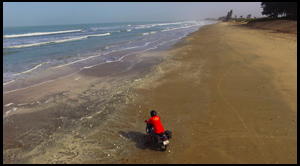While waiting for a customs agent to come to an agreement with a man that had many jerry cans of palm oil on our minibus, we stood in the road and listened to Chéché Dramé on my girlfriend’s cellphone. Trucks and busses tore past, slaloming around potholes, teetering on their tires. Farmers and villagers rode by silently on bicycles laden with fresh cut greens — dinner for sheep. And then a girl, limbs outstretched, riding an oversized bike. She turned to Bintou and smiled: “Chéché!”
It was hot during the day. In Korhogo, in between arguments with Sama’s chef de gare (Sama had caused us much grief on this trip after starting our journey with a bus that had expired insurance), we sipped the afternoon air with shallow breaths and fanned ourselves in the fly ridden station. But here, on the side of the road in the early evening, the air was light and sweet, perfumed with rainy season vegetation. And it was quiet, in the way that a snow scene is quiet; every voice had its own space and didn’t make it very far. Except for Chéché’s voice, which I could still hear in the patch of thin forest where all the guys had decided to pee.
On September 15th, 2010 — two years ago today — a tire exploded on a car that was on its way to Bamako from Mauritania. The car flipped over and one of the passengers was killed instantly. That passenger was Fatoumata Mourdiah Dramé, more commonly known as Chéché, a 25-year-old star on the Malian music scene. Daughter to two griots, she had a mind-splitting voice and a presence that allowed her to have her way with any audience.
News of Chéché’s death quickly reached Bamako. She was on her way to the city to headline la Nuit du Bazin, an event that was part of Mali’s elaborate celebration to commemorate 50 years of independence.
It is hard to describe the depth of shock and sorrow that followed her death. The loss cut particularly deep among women and girls, but it was a punch to the gut for all Malians. You can get a sense for the level of grief in the video below.
Ministar is something of a karaoke contest for children, where kids emulate Malian artists. The young girl that represented Chéché in the world of Ministar was Awa Kone. When Chéché died, she was tasked with singing a tribute to her (can you imagine?). Awa does not hit all the notes, but her courage in front of an audience that is entirely in tears is remarkable. By the end of it, when Awa offers the final blessings and wishes for Chéché, she can barely keep it together herself.
click over to the post if you can’t see the video in RSS reader
Saa ma ɲi simply means death is terrible. In the song, she tells us, “Chéché taara da” — Chéché went to sleep.
Many Malians have a certain faith, a certain conviction that things will be better. On this day, when I remember Cheche’s arbitrary death, when I think about the number of people that are living a life in northern Mali that they did not ask for, when I think about how many people have fled their homes — I wish I had it, too.
RIP Chéché





Truly a sad story, but that video is really touching. She may not be an incredible singer but her emotion is clear, even though I didn’t understand the words.